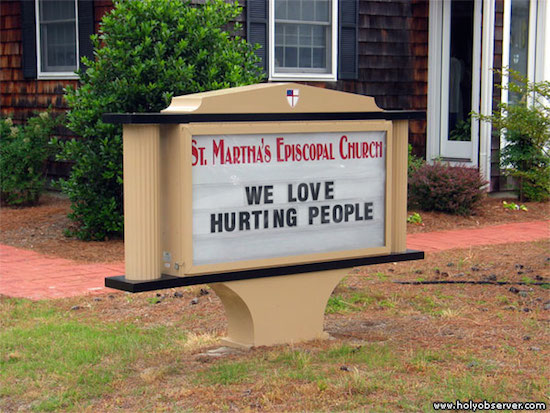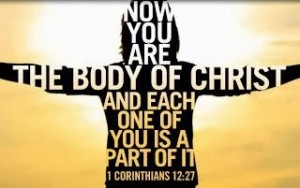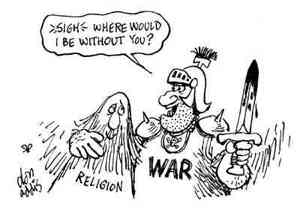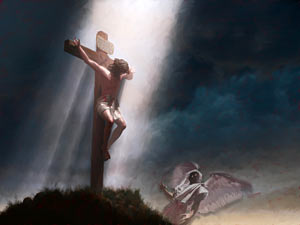Gotta be careful about what those church signs actually say…

Liberating you from bad ideas about God
Stop relying on pastors and Bible teachers to tell you what the Bible means.
Read this book and learn to study the Bible for yourself. Available now on Amazon.
The book discussion questions with each chapter to make it perfect for a home study group. There is also a LONG appendix on how to understand the violent passages in Scripture.
 There has been a huge push toward unity in the church over the past 40 years or so. People are tired of the numerous divisions and splits that seem to occur with increasing frequency within the church. And while some of our divisions involve important issues, such as whether or not Jesus was truly divine (He is) and whether or not God loves gays (He does, of course), a lot of church division seems to occur over stupid stuff, like what kind of music to play on Sunday morning, whether or not there should be donuts in the foyer, and what color the new carpet should be.
There has been a huge push toward unity in the church over the past 40 years or so. People are tired of the numerous divisions and splits that seem to occur with increasing frequency within the church. And while some of our divisions involve important issues, such as whether or not Jesus was truly divine (He is) and whether or not God loves gays (He does, of course), a lot of church division seems to occur over stupid stuff, like what kind of music to play on Sunday morning, whether or not there should be donuts in the foyer, and what color the new carpet should be.
Personally, I don’t think all church splits are a bad thing. I don’t think that deciding to leave one group of people so that you can join with a different group is always bad. To some degree, this is just the way life is, and sometimes, these sorts of reorganizations are simply one way of keeping the peace. When we view all different denominations and types of churches as parts of the universal Body of Christ, we begin to see that we are not in competition with one another, but are simply different parts of the same Body working in unison toward a common goal. I’ve written about this before in my post: The Church is Broken? Nope.
Of course, there does not always seem to be a whole lot “unison toward a common goal.” Instead, there is a lot of name calling, finger pointing, back stabbing, and heretic burning. I fully admit that I have engaged in a fair bit of this myself over the years. And I sometimes still do. I’m guilty too.
But here is what I am trying to come to recognize: Unity is not the same thing as uniformity.
I believe we can have unity within the church without uniformity. In fact, since there can never be true uniformity in all things, the only way to achieve unity is to recognize, accept, and celebrate our diversity.
Maybe some quick definitions are in order.
Unity is when we are one. We are of one mind, spirit, purpose, mission, and goal.
Uniformity is when we all believe the same thing and practice the same thing. We are uniform in our beliefs and behaviors.
I think that in general, all Christians everywhere are in unity. We have one Spirit, the Spirit of God. We have one purpose, to glorify God. We have one mission, to spread the good news about Jesus Christ. We have one goal, to lift up the name of Jesus and live like Him in this world.
Yet despite this unity, there is no uniformity whatsoever on how to do these things, what it looks like, or where and when to do these things.
Just take the “gospel” we are supposedly in unity about. Regarding the gospel, we cannot agree on the the definition and message of the gospel we are to proclaim! We cannot agree on who gets to proclaim it, or to whom it should be proclaimed, or what should happen after we proclaim it. There is even disagreement in some circles on what we should wear when we proclaim the gospel and what Bible translation we should use. Let’s be honest: It gets quite ridiculous.
I think it is possible — even desirable — to have unity without uniformity.
It is possible to have unity within the church only if we give up on uniformity. Unity is a Godly goal; uniformity is not.
 I can be happy that that certain members of my Christian family like Southern Gospel music even though it makes me want to cut my ears off. I don’t think that they should like my kind of music (which is pretty much no music at all) to be real Christians, and I hope they can extend the same grace toward me despite our lack of uniformity.
I can be happy that that certain members of my Christian family like Southern Gospel music even though it makes me want to cut my ears off. I don’t think that they should like my kind of music (which is pretty much no music at all) to be real Christians, and I hope they can extend the same grace toward me despite our lack of uniformity.
Similarly, though I am not a big fan of sitting in a pew on Sunday morning and calling that “church,” I know that for many people, this is an important part of the way they follow Jesus. Since this used to be essential for me as well, I understand where they are coming from, and can be in unity with them regardless of our differences in how we try our best to follow Jesus. I hope they can extend the same grace toward me despite our lack of uniformity.
I could go on and talk about my Calvinist friends, or those who think women should be silent in church, or those who vote democrat. I may disagree with these perspectives quite passionately, but in the end, I choose to put aside my differences and love others for the sake of unity in Christ, not expecting them to become a clone of me, and hoping that they do not expect me to fall into step behind them.
It is exactly this unity without diversity which best expressed the love of Jesus, and which paves the way for us to invite the world into our midst. The world, I believe, wants to follow Jesus, but they are not sure they want to become “Christians.” If we can open up our arms and say, “No problem! There is room among Jesus followers for all kinds of Christians,” this sort of loving unity would go a long way in glorifying God, spreading the good news about Jesus Christ, and living like Him in this world.
So do you want Christian unity? Begin by recognizing, encouraging, and celebrating our immense diversity.
This post was part of the April Synchroblog, where various bloggers all write on the same topic. Below is a list of the other contributors this month:
 My friend, Sam Riviera, wrote this about how he spent Easter:
My friend, Sam Riviera, wrote this about how he spent Easter:
Amazing grace,
How sweet the sound.
That saved a wretch like me
I once was lost,
But now am found.
Was blind,
But now I see.
We spent Easter morning with the outcast — the lame, the halt, the thieves, the alcoholics, the drug-addicts, the murderers. We climbed out of our warm beds and headed out into the streets laden with bags of clothes, food and water. We shared what we had with those who had slept under bushes, on the ground and any other place they could find.
Happy Easter! Happy Easter! Almost every person greeted us with “Happy Easter!”
These are supposed to be the people who don’t know Jesus. Yet they know Jesus. They have seen Jesus walking among them. He has danced with them. He loves them. They like Jesus.
Jesus was with them in prison. He visited them there. He was with them in Southeastern Asia when they spent the years rotting away in bamboo cages lowered into holes. He was with them as they walked the streets of America, looking for a place to lay their head. They told us Jesus was with them.
“Grace. It’s all about grace. No matter had bad we screw up, God’s grace is still good. He never forgets us. He’s always there. He’s always been there for me. He’s been there the last eighteen years while I’ve traveled around the country. I don’t have a dime to my name, but I’ve got God’s grace. It’s all about grace. Don’t ever forget that.”
So said the man sitting on the sidewalk on Easter morning. The man with no home. The man with nothing. But he knows that Jesus lives!
“See this mark behind my ear,” said another. That’s where the VC shot me. The bullet came out through my nose. See this big white patch on my thigh” he said, pulling up his pant leg. “That’s where they got the skin to graft onto the left side of my face. Another bullet ripped a big hole there and they had to patch it. God got me through it and He’ll get you through whatever comes your way too.”
We went to give a cup of water, a warm coat. We found Easter. The risen Jesus had been there. The risen Jesus was there, walking among those outcast and despised by the world. He too had been outcast and despised. He knows what it’s like. He walks among those He loves. They see Him. They see the One who was despised, rejected and afflicted. He is one of them.
He is risen!
He is risen indeed!
He walks among His people.
He loves us. Whether we’re thieves, adulterers, liars, cheats, gluttons, alcoholics or murderers, He loves us.
Whether we see Him in a fancy building with stained glass windows or dancing with us in the streets, He’s there. He’s alive.
If you haven’t seen Him, walk with those who do see Him. Perhaps you’ll catch a glimpse. Perhaps He’ll come and sit with you. Perhaps He’ll dance with you.
And YOU can help.
Fill out the form below to receive several emails about how to love and serve the poor and homeless.
(Note: If you are a member of RedeemingGod.com, login and then revisit this page to update your membership.)
 In Part 1 of this short series called “Satan Casts out Satan” we saw that although Satan stole dominion over the earth from Adam and Eve, Satan loves nothing more than to use violence to get rid of violence, and in so doing, consolidate and amplify his own power over the earth. One way he does this is through violent religion. This post looks a little more at this topic.
In Part 1 of this short series called “Satan Casts out Satan” we saw that although Satan stole dominion over the earth from Adam and Eve, Satan loves nothing more than to use violence to get rid of violence, and in so doing, consolidate and amplify his own power over the earth. One way he does this is through violent religion. This post looks a little more at this topic.
God was not inactive during this endless cycle of Satan using religion to “cast out Satan.” He constantly sent messengers, individuals, people, and even nations in an attempt to spread light and love in this dark world. But it is in these instances where Satan’s power really worked. Satan loved nothing more than to use redemptive violence against those whom God had sent so that God’s messengers were killed in God’s name (Matt 21:33-46, 23:34-37). How did Satan do this? Through religion.
God’s message to the world has always been a message of grace, love, mercy, forgiveness, and acceptance. But Satan has always taken God’s message and perverted it so that it becomes a twisted set of rules, regulations, sacrifices, and laws by which mankind seeks to regain God’s love and favor.
But whenever God sent messengers and prophets to proclaim grace to the world, religion reared up to condemn God’s message of grace as false, heretical, contrary to God’s will, and of the devil. Then, having used religion to convert God’s messenger into a messenger of Satan, Satan used religious redemptive violence to kill and destroy God’s messenger in the name of God.
Satan turns God’s messenger into “Satan,” and then uses violent religion to destroy this newly minted “Satan.” It is in this way that Satan “casts out Satan,” and once again, protects and consolidates his own power in the world.
 So by causing violence to be ascribed to God, and by using violent religion to “cast out Satan,” Satan had developed the perfect cycle of violence from which there seemed to be no escape. When bad things happened, it was God’s fault. And when God sent messengers to proclaim His truth and love, Satan vilified them until they too were killed in the name of God. This beautiful lie was perpetrated upon the world and carried out in plain view over and over and over since time began.
So by causing violence to be ascribed to God, and by using violent religion to “cast out Satan,” Satan had developed the perfect cycle of violence from which there seemed to be no escape. When bad things happened, it was God’s fault. And when God sent messengers to proclaim His truth and love, Satan vilified them until they too were killed in the name of God. This beautiful lie was perpetrated upon the world and carried out in plain view over and over and over since time began.
But when Jesus arrived, He began to unmask the lie and pull back the curtains on Satan’s scheme. He told people what God was really like. He invited people to turn away from violence, and live in love and forgiveness. He set people free from sin, from darkness, from slavery, and from hate. He called people to a new way of living.
This, of course, was not something Satan could allow. It was not something Satan could permit. And so he resorted to the same ploy that had worked millions of times before. Every previous time that God had sent a messenger, Satan raised up religion to kill God’s messenger in God’s name. Satan did the same thing with Jesus, believing that such a plan would work as it always had before. He got religion to condemn Jesus as a son of Beelzebub, a blasphemer, an idolater, as one who was opposed to God and God’s Word. And then Satan got religion to kill Jesus in the name of God. Satan used religion to turn Jesus into a “Satan” so that religion could then kill Jesus in the name of God. Once again, Satan sought to “cast out Satan,” and thus solidify and consolidate his power even further.
And just as it had always done before, the plan worked beautifully.
Almost too beautifully.
One can almost feel the confusion of Satan in the end the Gospel accounts as Jesus, who has struggled and taught and healed against all the death and destruction and lies of the devil throughout His entire three years of ministry, now goes silently to the cross, like a lamb to the slaughter. Satan does not see the trap until it is too late.
 For all of human history, Satan cast out Satan so that he might continually reinforce his own power, and reinsert himself into human structures and institutions, forever consolidating and expanding his own power and dominion over God’s creation. But when he tried it with Jesus, he failed to recognize that he was snatching defeat from the jaws of victory.
For all of human history, Satan cast out Satan so that he might continually reinforce his own power, and reinsert himself into human structures and institutions, forever consolidating and expanding his own power and dominion over God’s creation. But when he tried it with Jesus, he failed to recognize that he was snatching defeat from the jaws of victory.
Jesus, of course, knew what Satan was about. This is why He asked earlier in His ministry: “How can Satan cast out Satan?” (Mark 3:23). Jesus asks this question, but never answers it. Why? Because the answer was the key to His victory over Satan. The initial answer to Jesus’ question seems to be that “Satan would not cast out himself. It would be foolish to do so. For if Satan cast out Satan, then his kingdom would crumble, his house would fall, and his power would come to an end.” But Jesus knew, as did Satan, that the key to Satan’s power was that Satan had been casting out Satan since the beginning of time, but blaming his violent overthrow upon God.
But in the crucifixion of Jesus, when Satan tries once again to use violent religion to “cast out Satan,” this time in the scapegoat of Jesus Christ, Satan did not realize that his plan would backfire.
When Satan attacked Jesus through the crucifixion, Satan believed he was conquering over Jesus and casting Jesus out of this world once and for all. But little did he know that Jesus, by submitting Himself as the willing scapegoat for all the violence, enmity, hatred, and evil of the world, was unmasking the power and dominion of Satan, and thus, defeating Satan even as Satan thought he was striking the victorious blow.
What do you think of this idea of Satan using religion to cast out Satan, which in reality, is nothing more than Satan using violence in the name of God to solidify his own power in this world? Include your own ideas in the comments below!
 How can a God who says "Love your enemies" (Matthew 5:44) be the same God who instructs His people in the Old Testament to kill their enemies?
How can a God who says "Love your enemies" (Matthew 5:44) be the same God who instructs His people in the Old Testament to kill their enemies?
These are the sorts of questions we discuss and (try to) answer in my online discipleship group. Members of the group can also take ALL of my online courses (Valued at over $1000) at no charge. Learn more here: Join the RedeemingGod.com Discipleship Group I can't wait to hear what you have to say, and how we can help you better understand God and learn to live like Him in this world!
I had an interesting conversation recently with a man who attends a local mega church. Well, the church is about 1000 people, so it’s not quite “mega” (Which I think is defined as 2,000+ in attendance).
He was challenging my decision to follow Jesus outside the four walls of the church building, and had the usual objections:
Him: Why would you leave Christ’s church?
Me: I didn’t leave it. I just practice church differently than you do.
Him: But how do you use your spiritual gifts?
Me: In a multitude of ways, none of which require my butt to be in a pew on Sunday morning.
Him: But Christians are to live in community. Where is your community?
Me: First, church attendance does not necessarily equal community, but second, I live in deep community with other people like myself who also do not sit in pews on Sunday morning.
Anyway, the conversation went on like this for some time. At one point though, he said this:
Him: But you could be accomplishing so much more for the Kingdom of God if you were part of a large group of people. Sure, your small community can accomplish a few small things, but imagine if you were all working together with thousands of others! Your work would be multiplied! You would see exponential growth!
I told him it was a good point, and one that I would consider.

I have since considered his point … and I would like your input on how you might respond to such a question. Here are my points. What can you add?
First, I have great trouble with this mindset that only big things are worthwhile.
Jesus constantly modeled that the small things, the unimportant people, the little children, the cup of cold water, the tiny mustard seed, the one act of faith, the shameful, the foolish, and the insignificant, … these are the things that mattered to God and where God was most at work.
Sure, Jesus performed some large-scale miracles, but it seems that as Jesus progressed in His ministry, He went smaller and smaller; not larger and larger. If Jesus had wanted to, He could have had thousands of followers at His back after 3 years of ministry. But this is not what He wanted. …So why is this what we want?
Even Jesus’ parable of the tiny mustard seed shows this. It is not uncommon to hear pastors say, “See? This church started as a tiny little group of people meeting in my living room. But now, it is thousands of people with a multi-million dollar budget. The tiny mustard seed has grown into a giant tree!”
It sounds good, but it’s plain wrong. Yes, the tiny mustard seed grows into a large tree so that even the birds can sit in its branches, but if we ever say our particular church or ministry is “the large tree” we have completely misunderstood what Jesus was saying.

What grows into a large tree? The Kingdom of God does … not my little corner of it. No matter how large we become, our part in the Kingdom will always be small.
Here is often how these comparisons go:
You and your small group did a good thing there helping that poor family in town pay their rent this month. But at our church, we raised enough money to build an entire orphanage in Africa and staff it for an entire year!
Sure, you’re small group of six people spent $300 to help that family, but if you could have joined that money with the $250,000 raised by our church this year to build that orphanage, imagine how your investment in the Kingdom would have multiplied!
Initially, such a comparison sounds compelling. It’s true … helping one family pay rent for one month does not sound as impressive as building and staffing an African orphanage to help rescue, feed, and teach orphans for a year.
But if you begin to crunch the numbers, things look quite different. If 6 people raised $300 in one month to help one family, then this comes to about $50 per person per month. Who’s to say they won’t do something similar next month? And the month after that? Over the course of one year, this is about $600 per person.
Meanwhile, if you take the $250,000 that church raised for the orphanage, and divide it between the 1000 people in the church, this comes to $250 per person.
Obviously, I’m just making these numbers up, but this is how these ministry comparison’s are often done. The tiny little ministry a small group does for a local need is compared with some giant project that a large group does for some other (usually foreign) ministry. But if you really start to compare apples to apples, you will almost always find that the small groups are more generous.
But what about what is accomplished? Isn’t that important? Yeah, let’s talk about that?
Here is the main concern I have with big ministry projects done by big churches. Usually (but not always!), because of the large scale of the project, there is relatively little personal interaction between the “givers” and the “receivers.”
Instead of six people helping out a family across the street, whose names are known, whose needs are obvious, and where relationships can get developed, 2,000 people give money into a giant pot to help a nameless “need” in some other part of town or across the country. Then, after administrative costs and overhead are deducted out of the money that comes in, a team of people goes out to perform the ministry to the massive group whose “need” is trying to be met.
But because the ministry team has to meet the “need” of such a large group of people, there is very little opportunity to get to know the people. Very little relationship building is accomplished.
Sure, bellies are filled, buildings are raised, classes are taught, and books are distributed, but how many long-term relationships were built? How many names were learned? How many conversations were had?
I sometimes think that the way some churches define ministry is not always identical to the way Jesus defines ministry.
If you write a check for $500 to help build an orphanage in Africa … but don’t know your neighbor’s first name, what good is it?
If you attend every mission’s conference your church hosts, but have never learned about the marital problems of your coworker, what good is it?
If you know your Bible forward and backward and memorize 365 verses a year, but don’t know the names of the children on your street, what good is it?
Look, everybody has different ministries and different goals, but I just get tired of having to defend small, one-on-one, loving-my-neighbor ministry to people who think that the only true ministry is one that costs hundreds of thousands of dollars, involved thousands of people, and takes place on another continent.
Ministry does not become more spiritual when it is baptized in salt water (when it takes place across the sea).
If you are not loving your neighbors right now, you cannot write a big check and call it “ministry.”
Okay… so you can weigh in below. Have you ever encountered this “Go big or go home” mentality when it comes to ministry, and that small groups of believers would be wiser to pool their time and resources with large churches so that their ministry effectiveness can be multiplied? If so, how do you respond?
